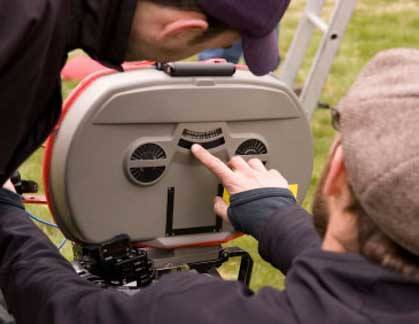Filmmaking
School and Career Guide
Here's the film school info you'll need to make good decisions about your education.

Overview
How to Get Started as a Filmmaker
Filmmaking is a cut-throat profession, and making it big may seem to be a daunting mission. However, a film degree from the right school can help you face the challenges you'll encounter along the way. Luckily, getting into film school, while competitive, is possible.
Every film school has unique requirements, but having a general idea of what admissions officers are looking for can help you become a more attractive applicant. Use our education and career guide to help get your important questions answered.
Filmmaker Skills and Traits
Strong abilities and skills in these areas contribute to success in a film career.
| YOU ARE … | YOU SHOULD HAVE … |
|---|---|
| Collaborative | Communication skills |
| Computer savvy | Fine arts skills |
| Creative | Leadership skills |
| Detail oriented | Management skills |
| Innovative | Problem-solving skills |
| Tenacious | Production skills |
| Visual | Technology skills |

Film Degrees
Your guide to selecting the film school program that is right for you.
How to Decide Between Programs
While only a handful of film school programs get the majority of the rave reviews and attention in the film industry, there are actually many good schools offering degrees. So if attending the crème de la crème of programs isn't possible, it doesn't have to be the end of your dream. Just because you might not attend Martin Scorsese's alma mater doesn't mean you couldn't be the next big name in film.
1. What Do You Want to Do?
One of the first steps to finding the undergraduate film school program that fits you best is figuring out your passion within the field. Film careers are wide-reaching, from the business side of production to directing. Here are some areas you can pursue:
- Casting
- Cinematography
- Digital Video
- Film Archiving
- Film Business
- Film Directing
- Film Editing
- Film Historian and Journalist
- Lighting Design
- Makeup and Special FX
- Postproduction
- Producing
- Production Design
- Screenwriting
- Sound Production
2. Define Your Deciding Factors
Film school programs come in many different shapes and sizes. Your experience will vary depending on whether you choose a traditional bachelor's or master of arts program or an immersion program. When considering different film schools, you should ask the following questions:
How long is the program?
Do you want to enter the industry as quickly as possible, or do you want a liberal arts education in addition to film career training?
What is the school's reputation?
Even if you don't attend a highly-acclaimed program, you'll want to make sure that the school you choose is respected and established. Checking out a school's accreditation status can also be a way to ensure that your education will meet high industry standards.
Who are the faculty?
Have the professors worked in the industry? Do they have practical experience and advice they can pass on to you? Knowing who your teachers will be can help you make a good decision about which film school program is right for you.
Where is the school located?
Location matters when choosing a film school. The best schools tend to cluster around industry hubs. For example, the film industry in Los Angeles, New York, and Vancouver is thriving. As a result, film production and education options in these cities are plentiful. The proximity allows schools to take advantage of being in the heart of the action, which offers students and faculty the opportunity to engage directly with working filmmakers.
3. Is a Film Immersion Program for You?
In a year or less, you could complete an immersion program in filmmaking. This shortened time frame is certainly one of the most obvious perks of the program. You will get a broader range of hands-on experience faster than you would in traditional film school programs. However, with classes taking up roughly 30 hours in any given week (this may vary from school to school), and assignments to complete outside of class time, holding a job outside of school would be difficult or even impossible.
What Are Examples of Some Classes?
No matter which area of film you want to enter, some curriculum will cross all job titles. For example, no matter if you want to be a lighting technician or post-production editor, you'll take courses such as these:
- Introduction to Digital Filmmaking
- Screenwriting
- Mathematics
- Film History
- Film Theory
- Cinematography and Lighting
- Digital Editing
- Music and Soundtrack
- Business of Film
In your fourth year, you'll likely be required to complete a college capstone project that is self-directed and integrates liberal arts learning with your area of specialty. You will also put together a demo reel and may be placed in an internship where you will receive hands-on experience working with industry professionals.

Getting into Film School
If your dream is to walk down the aisle at the Academy Awards or achieve cult stardom, the time to start preparing for a successful film career is now. Take advantage of these five insights before filmmaking school begins, and you'll find yourself starting at the head of your class.
1. Find your style
Jean-Pierre Geuens, filmmaking school professor and author of "Film Production Theory," believes each student should choose a school that fits his or her personal style. So take the time before your classes start to develop your style. Are you into indie, blockbuster or experimental films? Do you prefer working on commercials, shorts, music videos or feature films?
2. Zoom Out
Once you have a feel for your preferences, the temptation is to focus only on what interests you. But even though keeping a hold on your personal creative flare is important, any good filmmaking school will challenge you to broaden your perspective—to imagine yourself as an actor, writer, set builder or crew member. One of the greatest benefits of filmmaking school is the opportunity you'll have to get a feel for the film industry as a whole and learn how to maneuver within it.
3. Exercise Your Inner Couch Potato
There is almost nothing more embarrassing than having to answer your professor at filmmaking school with "No, I haven't seen that film." So you might as well find a comfortable place on the couch. Take the opportunity you have now to watch all the classic, cult and blockbuster movies you can. And pay attention to the script, acting, scenery, effects, and cinematography as you watch. Get used to assessing films based on their creative and historic elements.
4. Focus Your Lenses
The greatest filmmakers have eyes that never rest. They live their art by looking for inspiration in everyday activities. Beautiful arrangements of objects, positioning of actors, viewpoints and color schemes can be inspired by something as simple as a trip to the supermarket or a bus ride in the city. Start a journal where you jot down or sketch your ideas. Filmmaking school will give you ample opportunity to turn these simple musings into movies!
5. Keep Filmmaking School in Perspective
A film degree will set you apart as a job applicant and help you build on the lessons of decades of directors, producers, and cinematographers. Instead of forgoing the education that can help you gain contacts and refine your style, let success stories inspire you to continue building on and adding to their legacy, both in filmmaking school and beyond

Salary
Learn what to expect from working in the film industry.
Film Industry Salaries
Predicting your future earning potential in the film industry is tricky. There are many key factors to consider. What kind of budgets will the productions have? Will you have a lot of downtime between projects? In addition, your salary may also depend on how well you network and how well-known you become.
The following are median annual wages for some film industry roles:
| JOB TITLE | MEDIAN ANNUAL SALARY |
|---|---|
| Producers and directors of stage, film, video, TV | $36,600 |
| Camera operators of film, video, TV | $61,800 |
| Film and video editors | $66,600 |
Sources: U.S. Bureau of Labor Statistics Occupational Employment Statistics, 2022
The salary information listed is based on a national average, unless noted. Actual salaries may vary greatly based on specialization within the field, location, years of experience and a variety of other factors. National long-term projections of employment growth may not reflect local and/or short-term economic or job conditions, and do not guarantee actual job growth.
In film industry jobs, the pay may not be the same on every project. You'll take some jobs for the credit rather than the money. In other words, you shouldn't enter the film industry because of the promise of a big salary. However, working in a job that challenges and excites you is a reward in itself. And with determination and luck, you can achieve the financial rewards as well.
Film Industry Career Outlook
The film industry is big business. Even so, there has been speculation about how increased ticket prices, faster turn-around times for the release of new movies online and new technology could negatively impact the bottom line for movie theaters and, by extension, the film industry.
Job growth for film and video editors and camera operators is still expected to grow by 9.4% through 2031, much faster than average for all occupations.
The good news: Increased demand for more movies and television programs is expected to drive job growth, as is international demand for U.S.-made movies. Because of the increasing use of special effects, the movie industry may be in need of more film editors.
The bad news: In broadcasting, the need for camera operators may go into decline because of automation in camera systems.
You probably already know that competition is stiff for jobs in the motion picture industry. It's a glamorous job and attracts more who want to work in the field than there are jobs. But don't let that discourage you: The best way to break into your filmmaking career is to get as much experience on film sets and at television stations as possible.
Categories
Filmmaking Degree & Career Guide
- Cutting Your Teeth in the Big Apple's Film Scene
- Film School Student Profile
- Film School: Digital Opens Doors on a Global Cinema
- Filmmaking Jobs: Who's on Set?
- Filmmaking School and Career Guide
- Filmmaking School Professor Profile
- Getting Into Film School
- Getting Started in Your Filmmaking Career
- Is a Digital Filmmaking Career for You?
- Lighting Technician Filmmaking Careers
- Rankings for Film School Programs
- Screenwriting Courses or Four-Year Degree?
- Should I Earn an MFA or a BFA in Screenwriting?
- Sundance Festival Launches Film Grads' Careers
- Television Jobs: Who's on Set?
- The Los Angeles Film Scene
- The Vancouver Film Scene
- Top 5 Careers After Film School
- Unions Can Boost Your Film Career
You may also like

Unions Can Boost Your Film Career

Getting Started in Your Filmmaking Career

